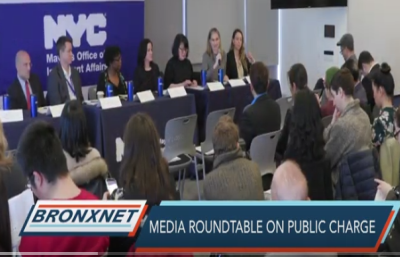[Coronavirus Pandemic\Public Charge Rule]
As the coronavirus spreads across the country, immigrants should be encouraged to access health insurance and medical care, but the Trump Administration’s rule does the opposite.
Photo: YouTube
Several state attorney generals are asking Trump to halt “public charge” rule amid COVID-19 crisis.
New York Attorney General Letitia James and a coalition of 17 additional attorneys general from around the nation have called on the Trump Administration to delay implementation of its Public Charge Rule as the coronavirus disease 2019 (COVID-19) progresses nationwide.
The Public Charge Rule drives immigrants and their families away from accessing the health benefits to which they are entitled by threatening their eligibility for green cards and visas. As the coronavirus spreads across the country, immigrants should be encouraged to access health insurance and medical care, but the Trump Administration’s rule does the opposite.
“Every person who doesn’t get the health coverage they need today risks infecting another person tomorrow,” said Attorney General James. “More and more individuals across the nation become infected with the coronavirus every day, yet the Trump Administration refuses to assure immigrants that getting the tests and health coverage they need will not be used against them. At this time, we should all be working to make testing and health coverage available to every single person in this country, regardless of immigration status. Our coalition will continue fighting to protect the health and well-being of our nation by halting this rule.”
Federal law allows lawful immigrants to apply for public benefits if they have been in the country for at least five years. But the new Public Charge Rule creates a “bait-and-switch” ― if immigrants use the public assistance to which they are legally entitled, they would jeopardize their chances of later renewing their visa or becoming permanent residents. As a result, since the spread of COVID-19 began in the United States, immigrants may now be afraid to seek out the health coverage they need to remain healthy.
Earlier this month, Attorney General James and a coalition of attorneys general sent a letter to the U.S. Department of Homeland Security (DHS) and U.S. Citizenship and Immigration Services (USCIS) seeking to suspend the Public Charge Rule as coronavirus infections began increasing in the United States. Though neither agency responded to the initial letter, last week, USCIS posted a confusing and contradictory alert claiming to offer a resolution for immigrants. The alert said the government would not consider any form of testing or care related to COVID-19 in immigrants’ public charge assessment, “even if such treatment is provided or paid for by one or more public benefits, as defined in the rule (e.g. federally funded Medicaid).”
In response, Attorney General James and the coalition have now sent another letter to DHS and USCIS again calling for a halt of the rule, pointing out that last week’s alert contains confusing and contradictory statements about the impact that using Medicaid would have on non-citizens.
“If DHS is attempting to ensure noncitizens in our communities remain enrolled in Medicaid so they can use Medicaid services should they have symptoms of COVID-19, the Alert fails to achieve this,” the attorneys general’s letter states. “And likewise, if DHS is attempting to ensure that noncitizens seek testing and treatment for COVID-19 without fear of public charge consequences, the Alert also utterly fails to achieve this.”
The letter continues, “The Alert fails to recognize that in order to receive adequate health services, our residents need adequate health insurance benefits. To achieve DHS’s stated goal of encouraging noncitizens to seek testing and treatment for COVID-19, noncitizens must be encouraged to enroll or remain enrolled in health insurance programs, including Medicaid, and they must be assured that such enrollment during this dire national health emergency will not be considered in any future public charge determination.”
The conflicting statements could cause immigrants to forgo medical treatment during this national crisis, which could be critical to protecting communities from the spread of COVID-19, the attorneys general write.
“Given the grave danger facing our nation’s health and economy, it is imperative that DHS not chill immigrants from enrolling in Medicaid or using Medicaid benefits for any purpose until the COVID-19 crisis is over. Under the Alert, however, noncitizens who remain enrolled in Medicaid continue to risk their green cards and visas. As DHS previously conceded, this will prompt immigrants to disenroll from Medicaid and lead to an ‘increased prevalence of communicable diseases,’ as the nation is now experiencing at a horrifying rate.”
They continue, “To protect the residents of our states and the rest of the country, we ask that DHS immediately announce that the Rule is stayed pending successful containment of COVID-19. Short of that, however, it is imperative that DHS at least make clear that enrollment in Medicaid and the use of Medicaid benefits for any reason will not be considered in the public charge assessment. Given that these benefits were not considered in the public charge assessment for many years prior to DHS’s recent change of policy, it is inexplicably harmful for the agency to begin counting them now, during the outbreak of a lethal global pandemic.”
Last August, Attorney General James and a coalition of states and New York City filed a lawsuit challenging the Trump Administration’s Public Charge Rule, citing that the rule specifically targets immigrants of color, while putting these communities at risk, and would have short- and long-term impacts on public health and the economy.
Joining Attorney General James in sending today’s letter to USCIS are the attorneys general of California, Connecticut, Delaware, Hawaii, Iowa, Massachusetts, Michigan, Minnesota, Nevada, New Mexico, New Jersey, Oregon, Pennsylvania, Vermont, Virginia, Washington, and the District of Columbia.







